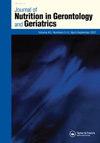根据迷你营养评估的营养状况预测康复患者功能改善的速度、程度和出院结局
Q3 Medicine
Journal of Nutrition in Gerontology and Geriatrics
Pub Date : 2019-11-13
DOI:10.1080/21551197.2019.1689882
引用次数: 1
摘要
摘要:本回顾性观察性研究评估了营养状况、功能能力和出院结局之间的关系。分析1430例老年康复患者的数据(43%为男性,中位年龄79岁,四分位数范围:74-84)。五分之一(20.6%,n = 294)的患者在入院康复时营养不良。三个重要的发现是显而易见的。首先,康复入院时的营养状况与入院和出院时功能、运动、认知和喂养评分降低相关(均P < 0.05)。其次,入院时营养不良与康复进展明显减慢有关。最后,入院时营养不良与入院时功能能力下降的几率显著升高相关(OR 3.95;95% CI: 2.14-7.27),出院时需要额外护理的几率几乎是其三倍(OR: 2.9 (95% CI: 1.02-8.3))。住院康复患者入院时的营养状况是康复的速度和程度以及出院结果的预测因子。本文章由计算机程序翻译,如有差异,请以英文原文为准。
Nutritional Status According to the Mini Nutritional Assessment Predicts Speed and Degree of Functional Improvement and Discharge Outcomes in Rehabilitation Patients
Abstract This retrospective observational study evaluated the association between nutritional status, functional ability and discharge outcomes. Data from 1430 older rehabilitation patients (43% male, median age 79 years, interquartile range: 74–84) were analyzed. One fifth (20.6%, n = 294) of patients were malnourished on admission to rehabilitation. Three important findings were evident. Firstly, nutritional status on admission to rehabilitation was associated with reduced functional, motor, cognitive and feeding scores on admission and discharge (all P < 0.05). Secondly, malnutrition at admission was associated with significantly slower gains in rehabilitation. Finally, malnutrition at admission was associated with significantly higher odds of a decline in functional ability during admission (OR 3.95; 95% CI: 2.14–7.27), and almost three times greater odds of additional care requirements on discharge (OR: 2.9 ((95% CI: 1.02–8.3). The nutritional status of patients on admission to inpatient rehabilitation is a predictor of both the speed and degree of rehabilitation gains and discharge outcomes.
求助全文
通过发布文献求助,成功后即可免费获取论文全文。
去求助
来源期刊

Journal of Nutrition in Gerontology and Geriatrics
Nursing-Nutrition and Dietetics
CiteScore
2.20
自引率
0.00%
发文量
13
期刊介绍:
The Journal of Nutrition in Gerontology and Geriatrics publishes original research studies that are directly relevant to clinical and community nutrition issues that affect older adults. Epidemiologic and community-based studies are suitable for JNE, as are well-controlled clinical trials of preventive and therapeutic nutritional interventions. The Journal of Nutrition in Gerontology and Geriatrics invites papers on a broad array of topics in the nutrition and aging field, including but not limited to studies of: preventive nutrition, nutritional interventions for chronic disease, aging effects on nutritional requirements, nutritional status and dietary intake behaviors, nutritional frailty and functional status, usefulness of supplements, programmatic interventions, transitions in care and long term care, and community nutrition issues.
 求助内容:
求助内容: 应助结果提醒方式:
应助结果提醒方式:


